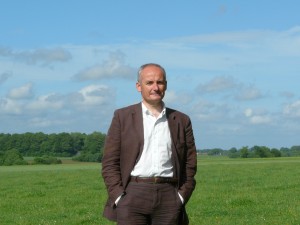- Rendez-vous de l'Institut
- Conference
Les Jardins Suspendus du Havre by Samuel CRAQUELIN – Château de Bénouville
The Suspended Gardens of Le Havre
Left derelict for many years, the fortress within which nestle the Suspended Gardens has benefited from an ambitious rehabilitation project. This exceptional site overlooks the Bay of Seine and offers admirable viewpoints over the low town, the port, the estuary and the incessant flow of boats. The site’s rehabilitation programme was to satisfy three conditions: to secure the site, to create a sustainable cultural venue devoted to the plant world and to invent a new form of cohabitation between the leisure and the workplace. It is within this exceptional 17-hectare site that a place has been created for people to stroll and to dream, a place evocative of flora from the five continents and plant travels across the oceans. The relationship between plants and the sea, between plants and journeys or great discoveries is omnipresent. Composed of plants that are indigenous to several regions of the world (North America, East Asia, southern lands…), the various gardens that have been created are a genuine gamble on the future, since the capacity of certain species to adapt to our specific climate is as yet unknown. The Suspended Gardens are thus an experimental garden which will evolve in time with the plants themselves, much to the pleasure of those who come to admire them.
Samuel Craquelin
Samuel Craquelin is from a family of farmers and very quickly associated his fondness of the land and his taste for drawing. After secondary school which led him to a horticultural apprenticeship, he studied at the Gembloux School of Landscape Architecture in Belgium. Diploma in hand, in 1985 he took on the challenge of setting up at “home”, convinced that his acquired skills could be of use to his homeland and to those in charge of its management. His agency, comprised of landscape architects, technicians and surveyors, develops a great variety of landscaping projects, both in urban and rural sites. His most noteworthy realisations are essentially located in Normandy and, more rarely, beyond the region’s frontiers. As mayor of a rural town, he pertinently perceives the difficult challenge facing such realisation and the often difficult communication between the various players involved in territorial development. He strives to obtain fitting recognition for his profession. His action offers him the opportunity to promote political commitment to respect our landscapes’ environment and balance. He believes that awareness of these three values – aesthetic, ecological, economical – is the key to his projects’ success.


